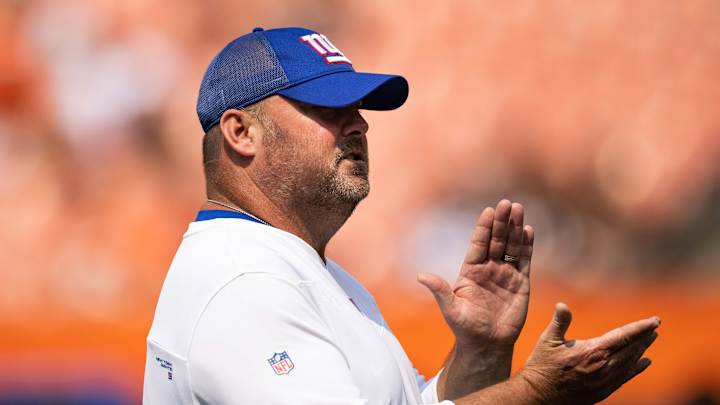What the New York Giants Offense Changed Under Freddie Kitchens

The New York Giants held the Philadelphia Eagles to one touchdown in their 13-7 week twelve win. The victory was possible due to the Giants' opportunistic defense that forced three Jalen Hurts interceptions and a timely Boston Scott fumble that Julian Love recovered in the game's final two minutes.
Jason Garrett’s departure as the offensive coordinator of the Giants was the storyline heading into this interdivisional matchup. Garrett joined the Giants along with Joe Judge at the beginning of 2021; the offense has been one of the least efficient offenses in just about every metric since he arrived at 1925 Giants Drive.
Freddie Kitchens, the former head football coach for the Cleveland Browns and currently the Giants senior offensive assistant, assumed play-calling duties upon the departure of Garrett.
Unfortunately, the offense still lacked potency; they were 3 of 12 in third-down situations, and they only gained 264 total yards. Quarterback Daniel Jones was 19 of 30 for 202-yards, and he had a touchdown pass to tight end Chris Myarick.
The Giants averaged 2.6-yards per carry, star wide receiver acquisition Kenny Golladay was targeted seven times with three catches for 50-yards, and Daniel Jones did target eight receivers.
The Giants also threw most of their passes to moving targets. Under Garrett, the Giants had their fair share of routes in which the receiver would start a route, stop, catch the ball, and have to start up again. Not surprisingly, that made it too easy for defenders to catch up and bring them down.
This week, that wasn't so much the case, and it showed in the average separation rate for the receivers.
The league average is 2.89 yards of separation, but the Giants had three receiving targets--receiver Darius Slayton (4.65 yards), tight end Evan Engram (3.08 yards), and tight end Chris Myarick (3.07 yards)--easily top the league average. While collectively 202 receiving yards wasn't much to sneeze at, the Giants did move the chains.
Kitchens didn’t reinvent the wheel, which shouldn’t have been expected given the short work week, but he was more aggressive down the stretch of the game, allowing Jones to throw the football more while somehow managing to end up with a balanced offense that favored the pass, 29-27.
The rushing attack was still ineffective, but there were some run-blocking tweaks. Rather than lean heavily on duo blocks and power/gap runs, as was the case under Garrett, the Giants incorporated some more trap blocks (a pull of a blocker to the play side of the formation to block an uncovered defender).
Kitchens also gave receiver Kenny Golladay opportunities to use his big frame near the goal-line; he was targeted twice inside the 5-yard line (three times in the red zone), both goal-line targets on a fade and the second being a poor throw from quarterback Daniel Jones.
Tweaks aside, the Giants offense's season-long issues, such as not sustaining drives and settling for field goals, remain a problem. The Giants had an 11-play, 47-yard drive, a 10-play, 59-yard drive, an 8-play, 47-yard drive, and a 12-play, 70-yard drive that netted only 13 points--and that’s despite getting four defensive turnovers.
To be fair, the Giants were coming off a short work week and continue to miss a large chunk of their playmakers. Also, the roster is what it is, so any wholesale changes are unlikely to be made until next year.
That said, it will be interesting to see what other changes Kitchens and the staff plan to make and whether they result in enough progress to answer some lingering questions about the direction of this franchise's offense.
Join the Giants Country Community
- Sign up for our FREE digest newsletter
- Follow and like us on Facebook
- Submit your questions for our mailbag
- Listen and subscribe to the daily LockedOn Giants podcast.
- Subscribe and like the new LockedOn Giants YouTube Channel
- Sign up for our FREE message board forums
- Subscribe and like our YouTube Channel
